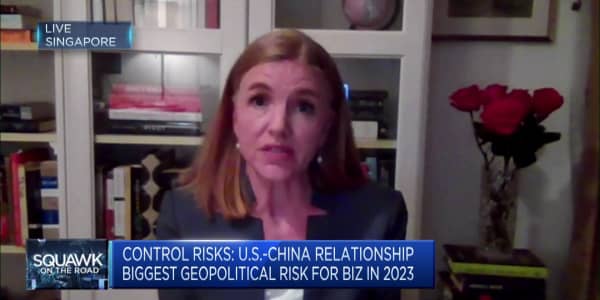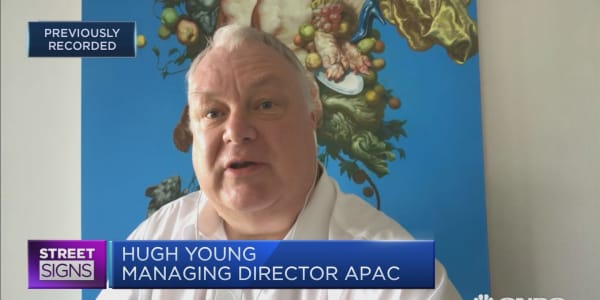With the poised for only modest gains this year as geopolitical tensions give investors plenty to think about, analysts and economists have told CNBC that plenty more shocks could be on the horizon before year-end.
The U.S. benchmark has logged gains of 9.5 percent so far this year, after surging 30 percent in 2013. Japan's Nikkei has fallen 4.5 percent after rallying 56 percent last year and the Euro Stoxx 600 Index has edged 4 percent higher so far after 2013's 17 percent gain.
Equity markets have suffered a succession of dips aside from the tensions in Ukraine. Traders have seen jitters over stock valuations, the condition of Portugal's banking sector, a fall in emerging market currencies and concerns regarding the future path of central bank policy. With these fears likely to remain on the back burner for now, market watchers have told CNBC what is keeping them up at night and what investors should be concerned about heading into 2015.
War in Ukraine
A recent Russian convoy carrying what Moscow said was humanitarian aid managed to complete its mission without major complications, but the fighting continues in east Ukraine. Government forces continue to try to push back pro-Russian rebels who took control of parts of the country following a regime change in Kiev and the annexation of Crimea by Russia.
An "outright Russian invasion and war" with Ukraine would be worst case, according to Christian Schulz, a senior economist at German-based Berenberg Bank. Sanctions between western nations and Russia have been enforced and Schulz says it's possible that more could come, thus causing the possibility of a selloff for German exporters and industrial stocks, who have heavy exposure to the region.
ECB gets it wrong
A slew of stimulus measures has already been announced by the European Central Bank (ECB) this year but many expect the introduction of a major asset purchase program as well as eagerly anticipating the results of an asset quality review into the region's lenders.
Read MoreCorrection coming for Chinese stocks, chart shows
Brenda Kelly, a market strategist at IG Markets says that traders are busy pricing in a quantitative easing (QE) program by the ECB. But this means that the central bank faces the risk of acting too late and could well bring about disappointment to equities in the region, she said.
Meanwhile, the so-called stress tests will pose a difficult balancing act for European equities, according to Schulz. "Positive results could undermine the credibility (of the review), he told CNBC via email. "Negative results could lead to a wave of capital raising," he added, expecting banking stocks to see volatility in the near term, with the results set to be released in late October.
Fed rate hike
With the U.S. being the largest economy in the world, every nuance from the mouth of Federal Reserve Chair Janet Yellen is still being closely watched by traders across the globe. With the central bank about to finish "tapering" its asset purchase program and formulate plans to raise its main benchmark interest rate, this is one of the main risks for the short term, according to analysts.
"More hawkish dissenters on the FOMC (Federal Open Market Committee) could make investors nervous. High U.S. rates could hit bonds, equities in general and EM (emerging market) currencies," Berenberg's Schulz said.
Read More S&P 'running on fumes': SocGen's Albert Edwards
IG's Kelly has concerns over what a rate hike could do for U.S. exports. With the ECB expected to move in the other direction with a QE program - thus helping to weaken its currency - she said that a stronger dollar could well be to the detriment of a fragile U.S. recovery.
"The stagnation in Europe will have a net-negative effect on U.S. growth," she told CNBC via email. "The DAX is the leading index for me presently...the correction is not yet over. I expect that another dip down through the 9,000 (point) level is on the cards in (the third quarter) – this will lead the other indices south."
Taking a more macroeconomic view, Thorsten Polleit, the chief economist at Degussa Goldhandel, a gold and silver trading firm, told CNBC via email that "excessive" monetary policies around the globe has resulted in a gigantic "asset price bubble." He fears that a slowing down of credit flows - as the current period of record low interest rates comes to a halt - could provide a major risk for equities.
"The piper will have to be paid. It would be this very development that would make the 'house of credit cards' come crashing down," he said. "Companies that are highly exposed to credit markets will be particularly vulnerable, banks in particular. But also highly leveraged firms would run into trouble...firms that sell products which are bought on credit (like the car industry) could suffer severely."
—By CNBC's Matt Clinch





